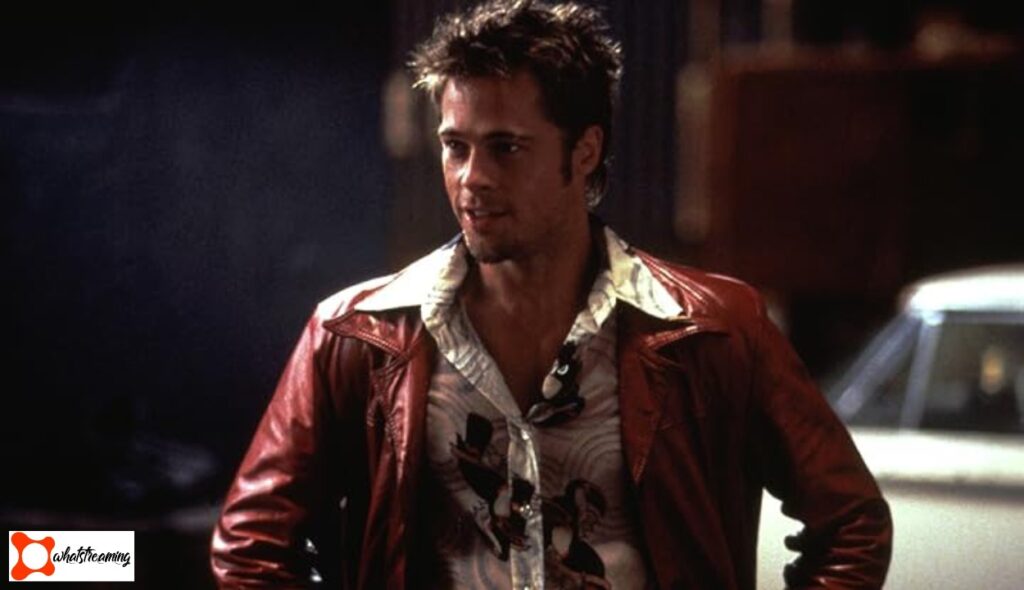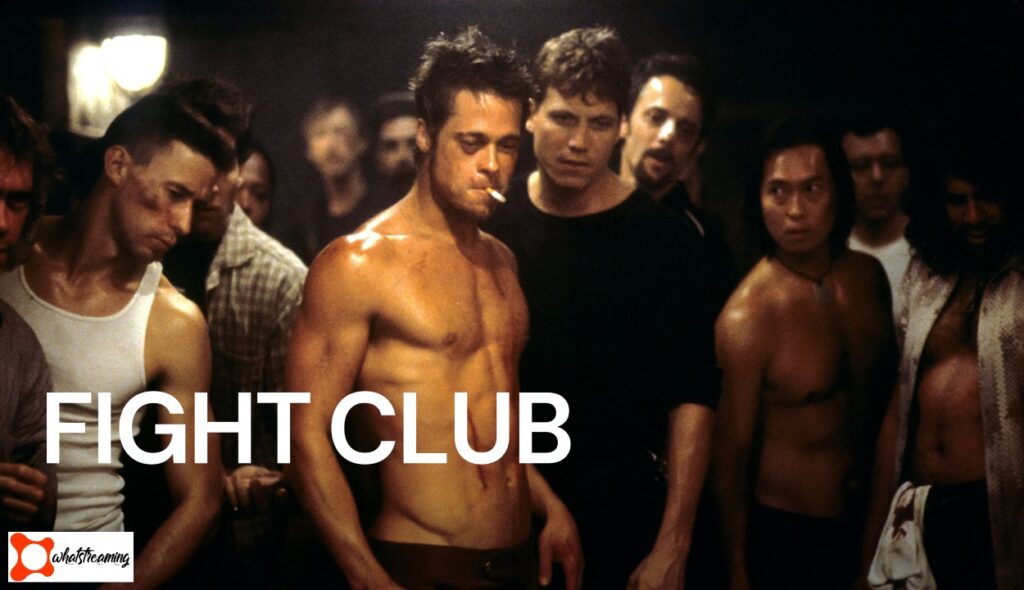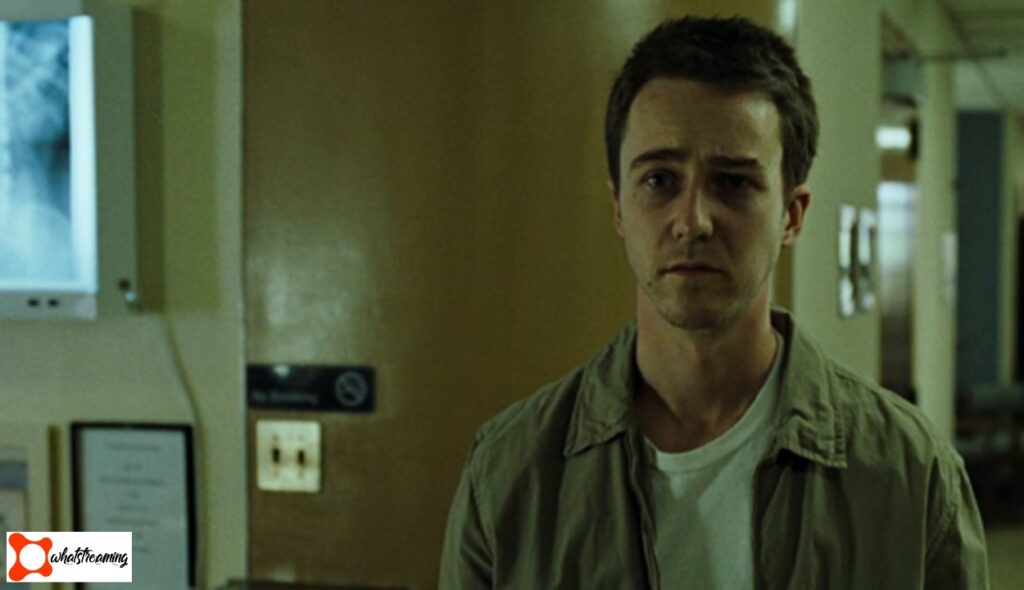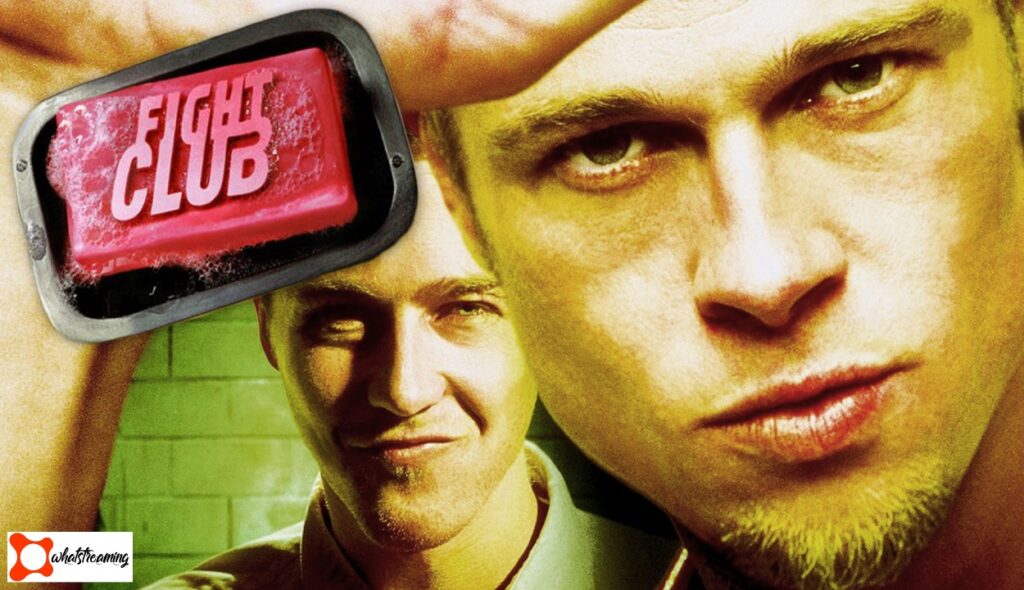Fight Club (1999)

“Fight Club” is a 1999 film directed by David Fincher, based on the 1996 novel of the same name by Chuck Palahniuk. It stars Edward Norton as the unnamed narrator and Brad Pitt as Tyler Durden. The film explores themes of consumerism, masculinity, and identity through the story of an underground fight club. It gained a cult following for its provocative and thought-provoking narrative. However, it’s worth noting that the film’s content is mature and contains graphic violence.
Characters:
“Fight Club” features several memorable characters, including:
The Narrator (played by Edward Norton): The film’s protagonist, who remains unnamed throughout the story. He is a discontented and insomniac office worker suffering from existential angst.
Tyler Durden (played by Brad Pitt): A charismatic and anarchic figure who becomes the Narrator’s alter ego. He starts the underground fight club and challenges societal norms.
Marla Singer (played by Helena Bonham Carter): A troubled and nihilistic woman who forms a complex relationship with the Narrator and Tyler Durden.
Robert “Bob” Paulson (played by Meat Loaf): A member of the fight club who suffers from testicular cancer, contributing to the group’s discontent with their lives.
Angel Face (played by Jared Leto): A handsome and enigmatic member of the fight club who becomes Tyler’s second-in-command.
The Mechanic (played by Holt McCallany): A member of the fight club who assists in organizing and managing the underground fights.
These characters play pivotal roles in the film’s exploration of masculinity, consumerism, and the breakdown of societal norms.
Awards and Achievements:
“Fight Club” did not achieve significant awards recognition upon its initial release in 1999, but it has since gained a strong cult following and critical acclaim. Here are some notable achievements and recognitions associated with the film:
Cultural Impact: Over the years, “Fight Club” has become a cultural phenomenon and a cult classic, with a dedicated fan base and numerous references in popular culture.
Critical Acclaim: While the film didn’t receive many major awards, it was well-received by critics for its provocative themes, direction by David Fincher, and performances by the cast.
Home Video and DVD Sales: “Fight Club” became a major success on home video and DVD, contributing to its lasting popularity.
Influence on Filmmaking: The film has had a significant influence on contemporary filmmaking, particularly in its visual style and themes.
Literary Impact: The novel by Chuck Palahniuk, on which the film is based, also gained increased recognition due to the movie’s success.
While “Fight Club” didn’t win major Academy Awards or other prestigious honors, its legacy in the world of cinema is undeniable, and it continues to be celebrated by audiences and filmmakers alike.
Trivia:
Certainly! Here are some interesting pieces of trivia about the movie “Fight Club”:
Starbucks Cup: In one scene, there’s a subliminal shot of a Starbucks cup, which was inserted by director David Fincher to comment on consumerism.
Single Frames: The film includes single-frame flashes of Tyler Durden (Brad Pitt) before he’s officially introduced, hinting at his presence throughout.
Real Human Fat: The soap made in the movie from human fat is a real product, made with a combination of vegetable glycerin and various animal fats.
Hidden Penis: Director David Fincher included brief shots of Tyler Durden’s penis in several scenes, which went unnoticed by censors due to their brevity.
Chemical Burn: In the scene where Edward Norton’s character pours lye on his hand, Edward Norton actually had to have his hand bandaged for the remainder of the film’s shoot.
The Narrator’s Job: The Narrator’s job as a recall coordinator for a major car company was inspired by Chuck Palahniuk’s own experiences working for a car manufacturer.
The Author’s Cameo: Chuck Palahniuk makes a brief cameo appearance in the film as a convenience store clerk.
Hidden Tyler: The film subtly foreshadows the twist regarding Tyler Durden’s identity. Watch for moments where only the Narrator interacts with him, and other characters never acknowledge Tyler.
Unique Projections: In the scene where Tyler and the Narrator spliced in frames of explicit content into family movies, those projections were briefly shown in a few theaters screening “Fight Club.”
These trivia tidbits add layers to the film’s complex narrative and showcase the meticulous attention to detail by the filmmakers.
Runtime:
The runtime of the movie “Fight Club” is approximately 139 minutes, which is equivalent to 2 hours and 19 minutes.
Photos & videos :
Ratings:
“Fight Club” has received generally positive reviews from both critics and audiences, here are the ratings for the film:
Rotten Tomatoes: The film holds an approval rating of 79% from critics and an audience score of 96%.
IMDb: “Fight Club” has an IMDb rating of 8.8/10, making it highly regarded by viewers.
Metacritic: It has a Metascore of 66/100 from critics and a user score of 8.8/10.
“Fight Club” has maintained a strong and dedicated fan base since its release and is considered a cult classic by many.
Plot:
The plot of “Fight Club” revolves around an unnamed narrator (played by Edward Norton) who is a disenchanted and insomniac office worker suffering from existential angst. He leads a mundane life, obsessed with consumerism and feeling disconnected from the world.
Everything changes when he meets Tyler Durden (played by Brad Pitt), a charismatic and anarchic soap salesman. The two form an unusual friendship and decide to create an underground fight club as a form of male bonding and rebellion against societal norms. This fight club becomes an outlet for their frustration and a way to feel alive.
As the story progresses, the fight club evolves into a more radical and secretive organization known as Project Mayhem, led by Tyler. The narrative takes unexpected twists and turns, and the lines between reality and Tyler’s alter ego blur.
Without giving away too many spoilers, the film delves deep into themes of masculinity, identity, consumerism, and the consequences of rejecting societal conventions. It’s a thought-provoking and darkly satirical exploration of modern life and its discontents.
Summary:
“Fight Club” is a provocative and darkly satirical film that follows the journey of an unnamed narrator (Edward Norton), an insomniac office worker who feels trapped in a consumer-driven, soulless existence. He forms a unique friendship with Tyler Durden (Brad Pitt), a charismatic soap salesman who introduces him to an underground fight club as a way to rebel against the monotony of their lives.
The fight club becomes a symbol of masculinity and rebellion, attracting disenfranchised men seeking an escape from societal norms. However, as the club evolves into the more extreme Project Mayhem, led by Tyler, the narrative takes a surreal and unsettling turn.
Throughout the film, the line between reality and the narrator’s fractured psyche blurs, leading to a shocking twist that challenges perceptions of identity and conformity. “Fight Club” explores themes of alienation, consumerism, and the search for purpose, leaving viewers with a thought-provoking and often disturbing cinematic experience.
Novel:
Chuck Palahniuk, the author of the original novel, did write a sequel novel titled “Fight Club 2,” but it’s in the form of a graphic novel rather than a traditional novel. “Fight Club 2” continues the story of the characters and explores new themes.




